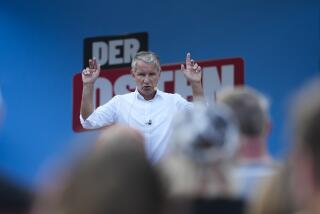German Left Skirts East-West Stalemate
PARIS ŌĆö At the West German Social Democratic Party Congress in Nuremberg last week, leadership passed to a new generation. The Atlanticist SDP of former Chancellor Helmut Schmidt is well and truly finished. Those who are the partyŌĆÖs new leaders have been formed in the moral climate of the anti-nuclear and ecological movements. They see the United States not as a liberating power but as an oppressive one.
National elections will be held in West Germany in January, and while the Social Democrats trail the governing Christian Democrats in the polls it is imaginable that they could take power in a coalition with the liberal Free Democratic Party or with the anti-nuclear and ecologically minded Greens.
The program that was adopted at the SDP congress included these pledges:
--To promote East-West arms limitation. The Socialists regard the United States as the principal obstacle.
--To press for the removal from West Germany of American intermediate-range missiles.
--To seek a nuclear-free zone in Central Europe.
--To cancel the existing West German agreement to collaborate in research for AmericaŌĆÖs Space Defense Initiative.
--To restructure the West German army, making it ŌĆ£incapable of attacking the Soviet Union.ŌĆØ
Such resolutions will be taken by many in Washington and elsewhere as evidence that West Germany is drifting leftward toward neutralism--even, conceivably, toward a Rapallo-like reversal of alliances and abandonment of the West.
Things are more complicated. The SDP platform reflects the resentment that is felt by many West Germans at GermanyŌĆÖs vulnerability to Soviet power and dependence on its allies--and most of all at its dependence on a United States from which these Germans feel morally estranged.
It reveals as well a yearning to be freed from the consequences of World War II. To attempt to establish a nuclear-free zone in Central Europe today is to attempt to establish a history-free zone--a fantasy for Germans more than all others.
It is this note of fantasy that makes people outside West Germany uncomfortable with the German left. It recalls times in the past when Germans followed imprecise ideas toward hazy and seductive objectives, with terrible consequences.
Yet West Germany is not really an anxious society today. Germans express solid and mounting optimism about the future, and a reluctance to abandon either the North Atlantic Treaty Organization or West GermanyŌĆÖs European attachments. The SDP itself proposes to keep West Germany in NATO, for now at least, and to strengthen the European Community.
Successive opinion polls have indicated that while in 1981 only 32% of West Germans looked to the future with confidence, in 1982 the figure was 34%, in 1983 it was 45%, in 1984 it was 55%, and at the end of 1985 it was 61%.
The SDP program reflects an essentially constructive ambition--the desire of the West Germans to take the countryŌĆÖs future into their own hands. Ecological and anti-nuclear resolutions of the kind passed at the congress serve as a substitute for the kind of political action that has been denied West Germans since the war, or that they have chosen to deny themselves. Thus if the United States and the Soviet Union seem unable to be moved on political and security issues, Germans will try to act in another dimension,a moral one, in which Realpolitik doesnŌĆÖt rule.
There was at Nuremberg another important theme--that of the community of interest between West and East. This meant not only the interests shared by the two Germanys, or the apocalyptic risks shared by the superpowers and their allies, but the interests that exist in common among the Central European states on the two sides of the East-West frontier.
Central Europe is a historical and cultural entity in which Germany has played a central role. Central Europe no longer possesses a political identity, but cultural forces are more enduring than those of politics or ideology, and this is important to Poles, Czechs and Slovaks and Hungarians--as well as East Germans--for whom Central European civilization represents an alternative to the Soviet political universe in which they now exist.
The real significance of what is happening in West Germany is that a part of public opinion no longer is comfortable with the political assumptions by which West Germans have lived for 40 years. The attempt is being made, however inadequately, to find some way out of the stalemate blocking the political evolution of Central Europe. And that is not such a bad thing.
It is an effort that makes people uneasy because it poses questions about the value of the alliance and disturbs the status quo. But NATO is no longer as solid as it used to be, and West Germans are attempting to deal with questions fundamental to NATOŌĆÖs future as well as to their own. The disapproval with which this is greeted in most alliance circles would be easier to comprehend if there were anyone else making a comparable effort.
More to Read
Sign up for Essential California
The most important California stories and recommendations in your inbox every morning.
You may occasionally receive promotional content from the Los Angeles Times.










